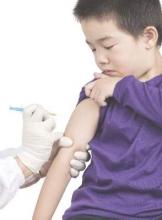Children given the inactivated Vero cell–derived vaccine (IXIARO) to prevent diseases caused by Japanese encephalitis virus (JEV) tolerated it well, Dr. Shauna Butler and her associates at the San Antonio Military Medical Center, Fort Sam Houston, Tex., reported.
Ninety-two children aged 2 months to 16 years (mean age, 6 years) received 145 doses of IXIARO when traveling to Japan or South Korea. In this population of 92 children, seven adverse events were documented within the 3 months after vaccination, with six adverse events in the 2- to 23-month age group and one adverse event in the 6- to 12-year age group. Only one event, which occurred 3 days after the second dose of the JEV vaccine, a fever, was believed to be possibly related to the vaccine; it occurred in a patient receiving an inactivated influenza vaccine on the same day as the JEV dose, which could have been a contributing factor, the researchers said.
It also was noted that none of the other documented adverse events was serious nor believed to be related to JEV dosing. None of the children required hospitalization.
“Our study’s confirmation of IXIARO’s tolerability in a pediatric population reinforces the recent decision [2013] to expand its use into this younger age group,” they concluded. “Practitioners should feel comfortable universally recommending vaccination against JEV for any pediatric traveler to an area of risk, and they can reassure families about the vaccine’s tolerability.”
Read the full study in the Journal of the Pediatric Infectious Diseases Society (doi: 10.1093/jpids/piw029).


